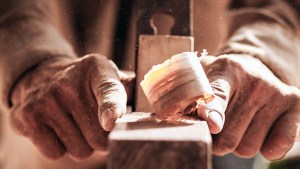Lenten Campaign 2025
This content is free of charge, as are all our articles.
Support us with a donation that is tax-deductible and enable us to continue to reach millions of readers.
When I was growing up, my dad always worked two jobs — sometimes more. He was an entrepreneur, and a good one, but all entrepreneurs know that businesses take time to build. So he spent his days building his business, and his nights waiting tables.
I vividly remember the chaos and excitement of Dad coming home from work after we got home from school. The four of us kids had about 20 minutes to fight for hugs and talk his ear off, telling him all about our days at school. He never told us to wait or give him a minute — he knew he didn’t have many minutes to spare, and those 20 minutes were his top priority because all too soon he’d have to give us kisses, direct us back to our homework, and go change into his waiter’s uniform. He rarely even had a chance to scarf down dinner before heading back out to work, and we were in bed long before he came home in the early morning hours.
I didn’t see anything strange about my dad’s second job for many years. It was the way it had always been, so to me it was normal for fathers to work all day, come home, then work all night. It wasn’t until I was in first grade and had a new friend over that I realized my experience wasn’t universal.
“Where’s your dad going?” my friend asked curiously. “He’s going to work,” I answered nonchalantly. I can still remember the pink suit jacket I was trying to force my Barbie’s rigid plastic arm into. “He’s a waiter at the Keg. They have the best salad bar because we get all the crunchy onion straws we want!” I added gleefully.
My friend wrinkled her nose. “Your dad waits tables? At a restaurant?” She glanced around my room doubtfully, as if she was suddenly unsure about this family she’d gone home from school with. I stopped trying to put the jacket on the Barbie and looked at her uncertainly. “Is that bad or something?” I asked.
She pursed her childish lips as if she were considering the question. “I guess not. He just must not have a very good job then,” she commented casually before going back to the Barbies spread out between us.
I had almost entirely forgotten about that conversation until I watched this video last night, where the actor Geoffrey Owens discusses being publicly (and virally) job-shamed for working at Trader Joe’s.
I hope what continues to resonate is the idea that one job is not better than another. That a certain job might pay more, might have better benefits, might look better on paper, but that essentially one kind of work is not better, superior, than another kind of work and that we reevaluate that whole idea and we start just honoring the dignity of work and respecting the dignity of the working person.
I couldn’t agree with this more. When my own family lived in Las Vegas, most of the friends we made were Trader Joe’s employees. They were kind, funny, hardworking, patient with our kids, and they taught me how to bag groceries like a pro. They invited us to parties and brought us presents when we had a baby. Sometimes I’d go to the Trader Joe’s down the street not because I needed anything, but because it got lonely in the desert and I just wanted the comfort of human contact. And the people who worked there were always happy to stop and talk for a bit. They made my days brighter and my life more bearable.
My friend in first grade was only 6. She had no capacity for understanding the ins and outs of adult life, the struggles of building a business and trying to provide for a large family. She was only repeating what she had heard — but therein lies the problem. The idea that one job is “better” than another because it pays you more money, or you have to wear a suit, or you get your own office and company car … that idea is poisonous to a culture. It causes us to devalue both the work that is seen as “less good” and with it, the workers who perform that work. It leads to a mindset that puts a price tag on people, assigning them an arbitrary value based on the kind of work they do rather than how they do it.
Work is essential and good for human beings. It’s part of our nature to work — subconsciously we long for work worth doing, and we long to do it well. And there is no work that is “more” or “less” valuable, no matter what monetary value is assigned to it. In fact, I’m far more grateful for the Target employees that give my kids the gift of clean restrooms than I am for the CEOs who decide what toy is going to be the new Christmas trend. I think we probably all are.
So let’s remember this when we talk about work, particularly with our kids. Let’s try and raise a new generation with an old understanding of the dignity of work, calling to mind the words of St. John Paul II:
“Work is a good thing for man — a good thing for his humanity — because through work man not only transforms nature, adapting it to his own needs, but he also achieves fulfillment as a human being and indeed, in a sense, becomes ‘more a human being.'”

Read more:
Do you know the everyday professions of these 9 hardworking saints?

